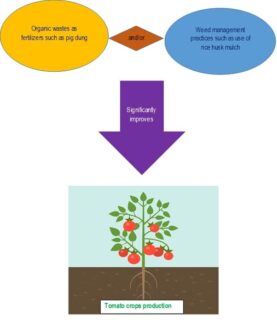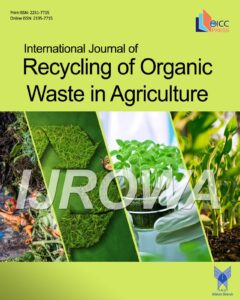Effect of organic waste as fertilizers and weed management practices on the growth and yield of tomato (Solanum Lycopersicum L.) in a derived savannah humid environment
Authors
-
Vivian Ogechi Osadebe
 1
1
- Jennifer Chinyere Igwe 1
-
Chinedu Felix Amuji
*
 1
1
-
Nathaniel Dauda
 1
1
- Amos Ejike Ede 2
Abstract
Purpose: To understand the effect of organic wastes as fertilizer and weed management on the growth and fruit yield of tomatoes to recommend the best organic waste fertilizer and weed management practices for the production of this crop in a derived savannah agro-ecology zone of Nigeria.
Method: The experiment was conducted in Nsukka, Nigeria where the climate is characterized by mean annual rainfall of about 1600mm, with a bimodal distribution pattern that peaks in July and October. The mean minimum and maximum temperatures are 21˚C and 31˚C, respectively. The relative humidity varies yearly, often in the range of 55-90%. The treatment is comprised of organic animal wastes as manure types which include: 20 t/ha of poultry manure, 20 t/ha of Pig dung, zero manure application(control), and 5 weed management practices: sawdust cover (17,000 tons/ha), rice husk mulch (23,000 tons/ha), black polyethylene mulch, hoe weeding, and weedy check. The treatment was laid out in a 3 x 5 factorial arrangement in a randomized complete block design with three replications.
Results: Among the mulch materials used, rice husk plots consistently recorded the highest tomato fruit yield per hectare (34, 222.0 tons/ha). On the organic wastes, the pig dung treatment performed better than others used, the yield recorded per hectare was (15,533.0 tons/ha) for the tomatoes.
Conclusion: The research found out that the use of pig dung should be adopted as well as the use of rice husk mulch on the soil surface as weed management practices to improve yield of tomatoes.
Highlights:
· Organic wastes as fertilizers and some others as weed management practices had significantly positive performance effects on the growth and yield of tomatoes.
· In all the organic wastes used as manure, pig dung treatments produced plants with the best-improved growth and produced more fruit yields for the tomatoes.
· The use of rice husk as soil cover in the experiment enhanced growth, suppressed more weeds, and also produced more yield of tomatoes compared to other management practices studied.
Graphical Abstract
Keywords
References
Abd-Allah AM, Safia MA, Abou-Hadid AF (2001) Response of some tomato hybrids to the organic fertilizer under newly reclaimed soil conditions. Egy J Hort 28: 341-353.
Akhtar K, Wang W, Khan A, Ren G, Afridi MZ, Feng Y, Yang G (2019) Wheat straw mulching offset soil moisture deficient for improving physiological and growth performance of summer sown soybean. Agric Wat Mgt 211: 16-25. https://doi.org/10.1016/j.agwat.2018.09.031
Aly HH (2002) Studies on keeping quality and storage ability of cucumber fruits under organic farming system in greenhouses. M.Sc. dissertation. Faculty of Agriculture, Cairo University, Egypt.
Bashir MA, Alvi AM, Rehmani MIA, Qasirani TB, Mahpara S, Tariq M (2019) Pollinators diversity for tomatoes crop under agroforest ecosystem of Dera Ghazi Khan Punjab Pakistan. Pure Appl Biol 8: 1487-1493. http://dx.doi.org/10.19045/bspab.2019.80088
Bayoumi YA (2005) Studies on organic production of tomato crop. Ph.D. Thesis, Faculty of Agriculture, Kafr El-Sheikh, Tanta University, Egypt.
Bond W, Grundy AC (2001) Non‐chemical weed management in organic farming systems. Weed Res 41: 383-405. https://doi.org/10.1046/j.1365-3180.2001.00246.x
Brault D, Stewart KA, Jenni S (2002) Optical properties of paper and polyethylene mulches used for weed control in lettuce. Hort Sci 37: 87-91. https://doi.org/10.21273/HORTSCI.37.1.87
Brown B, Hoshide AK, Gallandt ER (2019) An economic comparison of weed management systems used in small-scale organic vegetable production. Org Agric 9:53–63. https://doi.org/10.1614/WS-D-11-00222.1
Christians NE, Patton AJ, Law QD, Eds (2016) Fundamentals of turfgrass management. 5th ed. John Wiley & Sons, Inc. Hoboken, NJ, USA pp 1-22.
de Oliveira TR, Serafim AD, Breland B, Miller A, Beneton K, Singh V, Segbefia W, Argenta JC, Broderick SR, Tseng TM (2023) An integrated weed management approach in tomato using soil steaming, mulching, and winter cover crops. Front Agron 5:1075726. https://doi.org/10.3389/fagro.2023.1075726
Edmeades DC (2003) The long-term effects of manures and fertilisers on soil productivity and quality: A review. Nut Cycl Agro Ecosys 66: 165–180. https://doi.org/10.1023/A:1023999816690
Ehaliotis C, Zervakis GI, Karavitis P (2005) Residues and bye products of olive oil mills for root-zone heating and plant nutrition in organic vegetable production. Sci Hort 106: 293-308. https://doi.org/10.1016/j.scienta.2005.04.006
Eneji AA, Honna T, Yamamoto S, Masuda T (2003) Influence of composting conditions on plant nutrient concentrations in manure compost. J Plant Nut 26: 1595-1604. https://doi.org/10.1081/PLN-120022369
Frusciante L, Carli P, Maria R, Ercolano S, Pernice R, Matteo AD, Fogliano V, Pellegrini N (2007) Antioxidant nutritional quality of tomato. Mol Nutr Food Res 51: 609-617. https://doi.org/10.1002/mnfr.200600158
Gandhi N, Bains GS (2006) Effect of mulching and date of transplanting on yield contributing characters of tomato. J Res 43: 6-9. https://doi.org/10.5958/2249-5258.2019.00028.9
Gangawar SK, Sinha PS, Singh BD, Ramnagina JJ, Griya GUP (2000). Maximization of leaf yield of mulberry (Morus alba L.) and economic return per unit area of land from sericulture through mulching. Serico (France) 40: 491-497.
Gao F, Li H, Mu X, Gao H, Zhang Y, Li R, Cao K, Ye L (2023) Effects of organic fertilizer application on tomato yield and quality: A meta-analysis. Appl Sci 13: 2184. https://doi.org/10.3390/app13042184
Gao L, Gonda IH, Sun Q (2019) The tomato pangenome uncovers new genes and a rare allele regulating fruit flavor. Nat Genet 51: e10441051. https://doi.org/10.21273/HORTTECH.20.1.224
Ghafory O, Foster RE, Weller CS, McNamara KT (2018) Effect of weed management systems on tomato yield in Herat province Afghanistan. Asian J Sci Tech 9:8216–8218.
Gianquinto G, Borin M (1990) Effect of organic and mineral fertilizer application and soil type on the growth and yield of processing tomatoes (Lycopersicon esculentum Mill.). Riv Agron 24: 339–348. https://doi.org/10.5555/19910306048
Gordon GG, Foshee GW, Reed ST, Brown JE, Vinson EL (2010) The Effects of colored plastic mulches and row covers on the growth and yield of okra. Horticul Technol 20(1): 224-233. https://doi.org/10.21273/HORTTECH.20.1.224
Gurmu G (2019) Soil organic matter and its role in soil health and crop productivity improvement. Forest Ecol Manag 7(7): 475-483. https://doi.org/10.14662/ARJASR2019.147
Ibarra L, Flores D, Pérez JC (2001) Growth and yield of muskmelon in response to plastic mulch and row covers. Sci Hort 87: 139-145. https://doi.org/10.1016/S0304-4238(00)00172-2
Kandil H, Gad N (2009) Effects of inorganic and organic fertilizers on growth and production of brocoli (Brassica oleracea L.). Factori Si Procese Pedogenetice din Zona Temp 8: 61-69.
Mayele JM, Abu FR (2023) Determining the effects of selected organic fertilizer on growth and yields of tomato (Lycopersicon esculentum: Var. Rio Grande Tomatoes) in Mundri West County, Western Equatoria State, South Sudan. Agricultural Sci 14: 1343-1374. https://doi.org/10.4236/as.2023.149089
Mennan H, Jabran K, Zandstra BH, Pala F (2020) Non-chemical weed management in vegetables by using cover crops: A review. Agro 10:257-260. https://doi.org/10.3390/agronomy10020257
Ngouajio M, Ernest J (2004) Light transmission through colored polythene mulches affected weed population. Hort Sci 39: 1302-1304. https://doi.org/10.21273/HORTSCI.39.6.1302
Nkansah GO, Owusu EO, Bonsu KO, Dennis EA (2003) Effect of mulch type on the growth, yield and fruit quality of tomato (Lycopersicon esculentum Mill). Ghana J Hort 2: 55-64.
Norman JC, Opata J, Ofori E (2011) Growth and yield of okra and hot pepper as affected by mulching. Ghana J Hort 9: 35-42. https://doi.org/ 10.5555/20113407597
Oerke EC (2006) Crop losses to pests. J Agric Sci 144:31–43. https://doi.org/10.1017/S0021859605005708
Olubanjo OO, Alade AE (2018) Growth and yield response of tomato plants grown under different substrates culture. J Sustain Tech 9:110–123.
Ossom EPP (2001) Effect of mulch on weed infestation, soil temperature, nutrient concentration, and tuber yield in Ipomoea batatas (L.) Lam. in Papua New Guinea. Trop Agric 78: 144-151.
Pokluda R, Ragasová L, Jurica M, Kalisz A, Komorowska M, Niemiec M, Sekara A (2021) Effects of growth promoting microorganisms on tomato seedlings growing in different media conditions. PloS One 16(11): 0259380. https://doi.org/10.1371/journal.pone.0259380
Pramod KR, Nidhi A, Mitu S (2016) Edible coating of fruits and vegetables: A review. Int J Sci Res Mo Edu 1: 188-197.
Sanok WJ, Shelleck GW, Greighton JF (1979) Weed problems and phytotoxicity with herbicides in five tomato varieties. Proceedings of the Annual Meeting-Northeast Weed Science Society (USA): 332-335. https://doi.org/ 10.5555/19790378696
Shashidhar KR, Bhaskar RN, Priyadharshini P, Chandrakumar HL (2008) Effect of different organic mulches on pH, organic carbon content and microbial status of soil and its influence on leaf yield of M-5 mulberry (Morus indica L.) under rainfed condition. Cu Biotica 2: 405-412. https://doi.org/ 10.5555/20103023987
Shuaib OSB (2001) Critical period for weed competition in tomatoes (Lycopersicum esculentum Milli.). University of Aden Journal of Nat and App Sci 5 :11-18. https://doi.org/ 10.5555/20013137325
Uguru MI, Baiyeri, KP, Aba, SC (2011) Indicators of climate change in the derived savannah niche of Nsukka, South-Eastern Nigeria. Agro Sci 10: 1-10. https://doi.org/10.4314/as.v10i1.68718
Vinha AF, Barreira SVP, Costa ASG, Alves RC, Oliveira MBPP (2014) Organic versus conventional tomatoes: Influence on physicochemical parameters, bioactive compounds and sensorial attributes. Int J Brit Ind Bio Res Ass 67: 139–144. https://doi.org/10.1016/j.fct.2014.02.018
Wabwoba MS, Mutoro K (2019) Promoting Mucuna beans production for soil rehabilitation, incomes, food and nutrition security in Kenya. Global J Nut Fo Sci 2: 1-6. https://doi.org/10.33552/GJNFS.2019.02.000543
Waterer DR (2000) Effect of soil mulches and herbicides on production economics of warm season vegetable crops in a cool climate. Hort Technol 10: 154-159. https://doi.org/10.21273/HORTTECH.10.1.154
Worthington V (2001) Nutritional quality of organic versus conventional fruits, vegetables, and grains. J Alter Comp Med 7: 161–173. https://doi.org/10.1089/107555301750164244
Wu W, Lin Z, Zhu X, Li G, Zhang W, Chen Y, Ren L, Luo S, Lin H, Zhou H, Huang Y (2022) Improved tomato yield and quality by altering soil physicochemical properties and nitrification processes in the combined use of organic-inorganic fertilizers. Euro J Soil Bio 109: 103384. https://doi.org/10.1016/j.ejsobi.2022.103384
Zhou Z, Zhang S, Jiang N, Xiu W, Zhao J, Yang D (2022). Effects of organic fertilizer incorporation practices on crops yield, soil quality, and soil fauna feeding activity in the wheat-maize rotation system. Front Environ Sci 10:1058071. https://doi.org/10.3389/fenvs.2022.1058071




